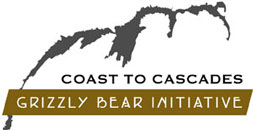A Night with Grizzlies - North Vancouver
Join the Coast to Cascades Grizzly Bear Initiative and the Squamish Nation to spend an evening with the grizzly bears of southwest British Columbia at North Vancouver's Centennial Theatre on Tuesday May 12th.
Learn about why grizzly bears matter, what we know about grizzly bears from the science, why what's good for bears is good for people and meet some of the people who dedicate their lives to these iconic bears. Our guest speakers for the evening will be three of those dedicated souls: Chris Morgan, Ecologist, Author, and PBS / National Geographic / BBC TV Host; Tony Hamilton, BC Ministry of Environment Large Carnivore Specialist and COASTtoCASCADES Field Director and lifelong BC backcountry guide Johnny Mikes.
Hear about their personal adventures with grizzly bears in our wilderness backyard, find out what they have learned from years working closely with bears and understand how what we know now about the grizzly bears of southwest British Columbia provides the key to preventing them from becoming locally extinct.
Chief Ian Campbell (Xàlek Sekyú Siyam) of the Squamish First Nation will emcee the event. The Nation recently passed a resolution emphasizing that the grizzly bear (Stl’lhalem) is an indicator of the health of the Squamish Nation land and people.
This is a great springtime talk as we already see grizzly bears and cubs emerging from their winter dens. COASTtoCASCADES hosted these same speakers in Whistler in Spring 2014 and the event sold out with dozens of people unable to get in - we recommend securing your spot early! Chris Morgan's book will be available on site and Chris will do a signing following the talks.
Doors will open 6:30pm for information gallery, show starts at 7pm.
Tickets: $15 general admission & $10 students/under 12's. Ticket button above will redirect you to Centennial Theatre's secure online booking portal.
About A Night With Grizzlies Guest Speakers:
ABOUT CHRIS MORGAN
Join ecologist and PBS & BBC TV host and narrator Chris Morgan for an adventure through the wild. From capturing grizzly bears and tracking them on foot for 2,000 miles over 2 seasons in the Rockies to launching and directing the award-winning Grizzly Bear Outreach Project, Chris's work with carnivores has been diverse and innovative. His engaging and authentic on-camera presence has brought him hosting and narration work seen on PBS Nature, BBC, National Geographic Television, and the Discovery Channel, along with an appearance on The Late Show with David Letterman.
ABOUT TONY HAMILTON
Tony Hamilton is one of a few “go to” people in the Ministry of the Environment about both bear species. His role is perhaps best described as “senior scientist on bear conservation and management in BC”, with a special emphasis on conservation of grizzly bears in threatened grizzly bear populations, major project impacts on grizzly bears, and mitigation of human-bear conflict. Tony represents BC on the cross-border Interagency Grizzly Bear Committee.
ABOUT JOHNNY MIKES
Coast to Cascades Field Coordinator Johnny Mikes has done extensive backcountry trips in many of the more remote corners of the Coast to Cascades region. For over 30 years, Johnny guided tours in a number of Canada's premier northern wilderness areas which provided the privilege of encountering several hundred grizzly bears. On-the-ground knowledge and a passion for wild places and wild animals led him to be involved in the creation of several new parks and participation in land use planning processes in Sea-to-Sky and northern BC. Whistler has been his home for the past 18 years.
Why Bears: Narrated by A Night with Grizzlies presenter Chris Morgan.
ABOUT COAST TO CASCADES GRIZZLY BEAR INITIATIVE
Launched in September 2013, the Coast to Cascades Grizzly Bear Initiative aims to restore the five threatened grizzly bear populations in southwest British Columbia and to connect grizzly bear habitat while encouraging environmentally responsible development. We can accomplish this by protecting grizzly bears from mounting threats and stemming their loss from our wild places, safeguarding year-round ample habitat, and ensuring connectivity between grizzly bear populations.




